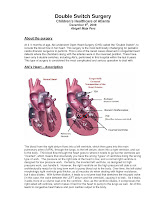Five Facts about Congenital Heart Defects
(reposted article: http://www.cdc.gov/Features/HeartDefects/)
Congenital heart defects are the most common types of birth defects. They affect nearly 40,000 infants born in the US each year. Learn more about congenital heart defects.
- Did you know that congenital heart defects are common?
Congenital heart defects are conditions present at birth that affect how a baby's heart is made and the way it works. They are the most common type of birth defects. In the United States, about 40,000 infants are born with a heart defect each year.
- Did you know that some heart defects can be found before birth, some at birth, or some after a baby leaves the hospital?
Some congenital heart defects can be found before birth. Knowing if a baby has a heart defect before birth can help families plan for the future. Some heart defects can be found at birth, because they can cause a baby to have bluish tinted nails or lips or troubled breathing. Also, some heart defects potentially can be detected in babies soon after birth using pulse oximetry screening, which is a test to determine the amount of oxygen in the blood and pulse rate. Certain hospitals screen all babies soon after birth using pulse oximetry screening. However, pulse oximetry screening is not required in most states. Other heart defects might have no signs at birth and are not found until later in life, during childhood or even adulthood. If a health care provider (a doctor or nurse) thinks a congenital heart defect is present, the baby can have several tests to diagnose the defect.
- Did you know that congenital heart defects can greatly affect the finances not only of the families involved, but of everyone?
In the United States, hospital costs for people with a heart defect were about $1.4 billion in one year. Families and the government share the burden of these costs, which means that all taxpayers are affected. Other costs due to lost wages or work limitations can affect families and businesses as well.
- Did you know that people with congenital heart defects are living longer?
As medical care and treatments have advanced, infants with heart defects are living longer and healthier lives. Many now are living into adulthood. About one million adults in the United States are living with a congenital heart defect. It is important for children and adults living with a congenital heart defect to see a heart doctor regularly throughout their lives.
- Did you know that some congenital heart defects can be prevented?
The cause of most congenital heart defects is unknown. Some babies have heart defects because of changes in their genes or chromosomes. They also might be caused by a mix of genes and other risk factors. The Centers for Disease Control and Prevention's National Birth Defects Prevention Study has found that women who are obese, have diabetes, or smoke during pregnancy increase their chances of having a baby born with a heart defect. A woman can take some important steps before and during pregnancy to help prevent congenital heart defects. She can work to get to and stay at a healthy weight, control diagnosed diabetes, quit smoking, and take folic acid daily. These actions can reduce the risk of having a baby with a congenital heart defect.
- Posted using BlogPress from my iPad
Abigail

Subscribe to:
Comments (Atom)
About Abi's Blog
HELLO!!
This blog is created not only to keep our family and friends updated on Abi's condition, events, surgeries and everyday life... but also to provide legit and educated information about Congenital Heart Defects that touch 1 in 100 babies.
Welcome to Abi's blog with hopes you will find it useful, interesting, touching and even entertaining...
Here are some facts about our sweet baby girl:
Abi was born on July 24th, 2009 with several heart defects that were detected prenatally at 18 weeks: Congenitally Corrected Transposition of the Great Arteries (Congenitally Corrected Transposition of the Great Vessels) (CCTGA = LTGA = L-TGA), Ebstein's Malformation (Ebstein's Anomaly) (malformed tricuspid valve), Pulmonary Stenosis and VSD.
Her first surgery - PA band - was scheduled for December 8th, 2009, however unexpectedly was changed to an Open Heart Surgery (OHS) called Double Switch performed on December 9th, 2009, originally planned for much later...
This blog is created not only to keep our family and friends updated on Abi's condition, events, surgeries and everyday life... but also to provide legit and educated information about Congenital Heart Defects that touch 1 in 100 babies.
Welcome to Abi's blog with hopes you will find it useful, interesting, touching and even entertaining...
Here are some facts about our sweet baby girl:
Abi was born on July 24th, 2009 with several heart defects that were detected prenatally at 18 weeks: Congenitally Corrected Transposition of the Great Arteries (Congenitally Corrected Transposition of the Great Vessels) (CCTGA = LTGA = L-TGA), Ebstein's Malformation (Ebstein's Anomaly) (malformed tricuspid valve), Pulmonary Stenosis and VSD.
Her first surgery - PA band - was scheduled for December 8th, 2009, however unexpectedly was changed to an Open Heart Surgery (OHS) called Double Switch performed on December 9th, 2009, originally planned for much later...
Second OHS was scheduled for March 3rd, 2010 to correct the baffle created during the 1st surgery.
Thank you for your support and prayers.
Art & Joanna (Asia) & Abi.
Thank you for your support and prayers.
Art & Joanna (Asia) & Abi.
You can CONTACT US at: blog@Care4Abi. com
“You never know how strong you are until being strong is the only choice you have!"
Thank you for your generous heart to help cover for Abi's medical expenses...
Early and Intermediate Outcome After Anatomic Repair of CCTGA
Archives
Videos
Popular Posts
-
It's time for the big one. Congenitally Corrected Transposition of the Great Arteries (ccTGA, LTGA). In normal, healthy heart there are...
-
Alright, time for another post. For today I picked another of Abigail's heart's complexities, namely Pulmonary Stenosis (PS). There ...
-
We found out today about the upcoming surgery in Atlanta.. It's scheduled on December 8th. We're leaving on Sunday, December 6th, ...
-
Transposition of the Great Arteries (TGA) In Transpotition of the Great Arteries both, Aorta and Pulmonary Artery are transposed (inverted) ...
CHD Abbreviations:
ASD - Atrial Septal Defect;
DILV - Double Inlet Left Ventricle;
HLHS - Hypoplastic Left Heart Syndrome;
HRV - Hypoplastic Right Ventricle;
LTGA - Levo-Transposition of Great Arteries;
PA - Pulmonary Atresia;
PDA - Patent Ductus Arteriosus;
PS - Pulmonary Stenosis;
TOF - Tetralogy of Fallot
VSD - Ventricular Septal Defect
DILV - Double Inlet Left Ventricle;
HLHS - Hypoplastic Left Heart Syndrome;
HRV - Hypoplastic Right Ventricle;
LTGA - Levo-Transposition of Great Arteries;
PA - Pulmonary Atresia;
PDA - Patent Ductus Arteriosus;
PS - Pulmonary Stenosis;
TOF - Tetralogy of Fallot
VSD - Ventricular Septal Defect







